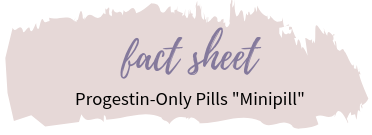Progestin-Only Pills “Minipill”
The “minipill,” or progestin-only pill (POP), is a method of birth control that contains only one hormone, a progestin. There are 2 types of minipills: norethindrone and drospirenone. The minipill is different from the combined oral contraceptive (COC or “the pill”), which contains progestin and estrogen hormones (find “the pill” fact sheet here). The minipill does NOT protect against sexually transmitted diseases (STDs).

How does it work?
The hormone in the minipill acts like the body’s natural hormone progesterone. It causes thickening of the mucus in the cervix and thinning of the uterine lining. It can also prevent the release of an egg but not consistently. Together, these effects make it hard for sperm to get to an egg (if there is one) and for an egg to implant in the uterus.
How well does it work?
When taken correctly, the minipill is more than 99% effective, but missing pills or taking them late is common, so the overall effectiveness drops to 91% with typical use. Overall, the minipill is slightly less effective at preventing pregnancy than COCs.
How do I take it?
Take the minipill by mouth on the first day of your period. If you are using the norethindrone minipill, you may take the first pill on any other day, but use backup birth control, like condoms, for 48 hours. Consistency is key with the minipill. Aim to take it at the same time every day. For the norethindrone minipill, all pills in the 28-day pack contain hormone. Because of this, it must be taken every single day with no skipping. For the drospirenone minipill, 24 pills in the 28-day pack contain hormone, and the last 4 are placebo (“sugar pills”). You may get your period during these 4 days.
What if I forget to take it on time?
If you are more than 3 hours late for the norethindrone minipill or more than 24 hours late for the drospirenone minipill, you should take the late or most recently missed pill as soon as you remember and resume the regular schedule. You may need to use a backup birth control method, like condoms, for the next 48 hours until the minipill continues to reliably prevent pregnancy. If you are on the drospirenone minipill, it is okay to miss any of the 4 placebo pills; no further action is needed to prevent pregnancy, but it is good practice to take them as regularly as the hormone pills so that you can maintain the habit and routine.
What if I want to get pregnant soon?
The minipill is a good option if you are planning to get pregnant within the next year. It is possible to get pregnant right after stopping the minipill.
What are some side effects I might experience?
The most common side effect of the minipill is changes in bleeding patterns. These can include bleeding between periods or not having a period at all. (If you miss 2 periods in a row while on the drospirenone minipill, call your health care provider.) The minipill may also cause changes in mood, skin (acne), or appetite. If you do experience some side effects, do not despair; they typically go away after 2 to 3 months of using the minipill.
Is it right for me?
The minipill is a safe option for most people, and it is especially appropriate for those who have recently given birth or are breastfeeding. The drospirenone minipill is a good option for those who are looking for birth control with fewer side effects of oily skin, weight gain, and hairiness. Some health conditions (history of blood clots, high blood pressure, migraine, smoking, and age over 35) make it unsafe to use COCs, so the minipill can be used instead. Talk to your healthcare provider for further guidance. Another consideration is the ability to remember to take the minipill every day at the same time. If you travel often and find it difficult to schedule your doses while keeping time zones in mind, the minipill may not be the best option for you.
Updated August 2020
